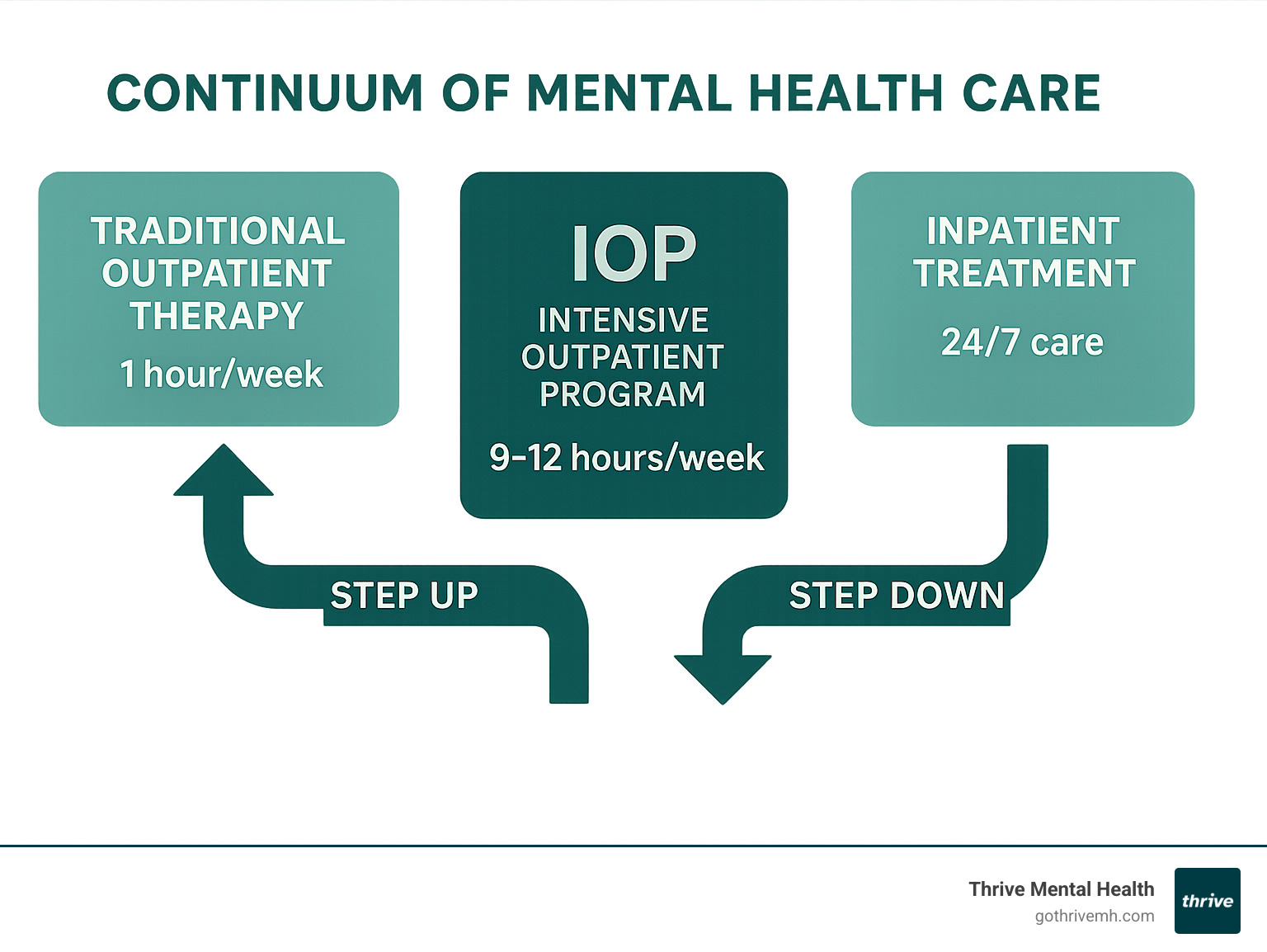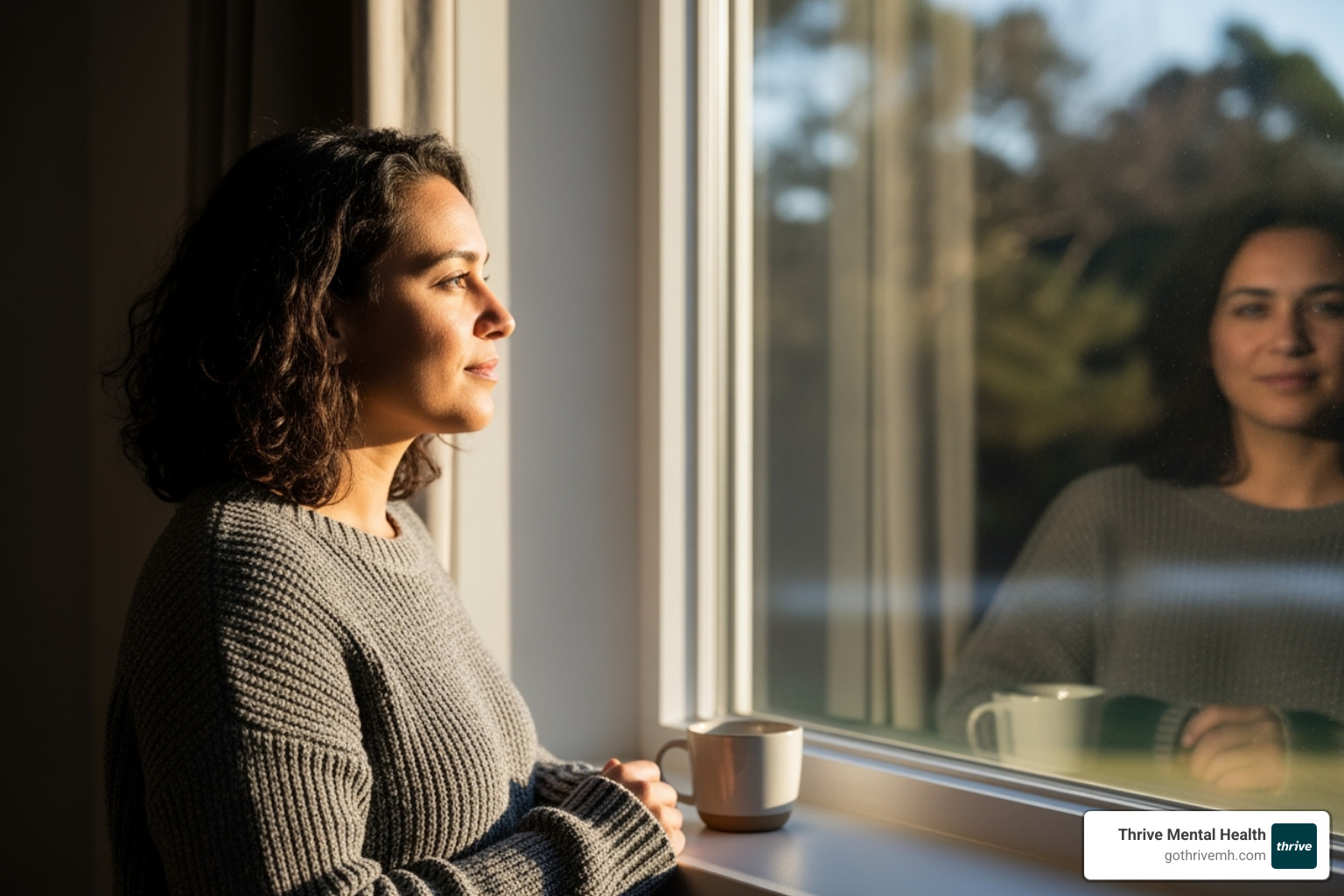Beyond Therapy: Understanding the Intensive Outpatient Program

Understanding What an IOP Means for Your Mental Health Journey
When exploring mental health options beyond weekly therapy, one of the most common questions is, what’s an IOP?
An Intensive Outpatient Program (IOP) is a structured mental health treatment providing 9-12 hours of therapy weekly while allowing you to maintain daily responsibilities like work or school. Unlike inpatient treatment, an IOP lets you live at home and attend therapy 3-5 times per week for a few hours each session.
Here’s what makes an IOP different:
- More intensive than regular therapy: 9-12 hours per week vs. 1 hour weekly
- Less restrictive than inpatient care: You go home each day
- Flexible scheduling: Morning, afternoon, or evening sessions are often available
- Combined therapies: Includes both group and individual sessions
- Average duration: Most programs last 8-12 weeks
IOPs are a crucial bridge in mental health care, ideal for those who need more support than weekly therapy but don’t require 24/7 supervision. Whether stepping down from inpatient care or stepping up from traditional therapy, an IOP provides the structured support needed for recovery.
Research shows IOPs can be just as effective as inpatient treatment for many conditions, including depression, anxiety, and substance use disorders.
I’m Nate Raine, CEO of Thrive Mental Health. With over a decade in behavioral health, I’ve seen how IOPs provide the perfect balance of intensive support and real-world flexibility, helping people understand what’s an IOP and how it can transform their recovery.

Important whats an iop terms:
So, What’s an IOP Exactly?

An Intensive Outpatient Program (IOP) is a flexible yet strong form of support for those who need more than weekly therapy but don’t require 24/7 care at a facility. Think of it as the perfect middle ground in mental health care.
When traditional therapy isn’t enough, an IOP steps up the intensity. When someone is ready to leave inpatient care, an IOP provides a structured bridge back to everyday life. We call this “bridging the gap” in treatment.
The beauty of an IOP is its flexibility. You get intensive support while maintaining your daily routines, applying what you learn in therapy to your real life immediately. Research shows that evidence-based treatment approaches used in IOPs can be as effective as inpatient treatment for many conditions because you practice skills where they count most.
What conditions does an IOP treat?
When people ask what’s an IOP good for, the answer is broad. While IOPs began in the 1980s for addiction, they’ve evolved to treat much more.
Today’s IOPs are effective for:
- Depression: Developing practical tools for mood regulation.
- Anxiety disorders: Building confidence and coping skills for generalized anxiety, panic disorder, OCD, and social anxiety.
- Substance use disorders: Offering intensive support while you maintain responsibilities.
- PTSD and trauma: Providing a safe space to process difficult experiences.
- Eating disorders: Helping rebuild healthy relationships with food and body image.
- Bipolar disorder: Teaching mood management strategies.
- Personality disorders: Using intensive therapy to address challenging thought patterns.
- Dual diagnoses: Treating co-occurring mental health and substance use issues.
For more detailed information, check out more on IOP for mental health.
A brief history and evolution
The story of IOPs began in the 1980s with programs for cocaine addiction. They targeted working professionals who needed intensive help but couldn’t leave their jobs for inpatient treatment.
This model was a game-changer. In the 1990s, managed care expansion helped IOPs grow as healthcare systems recognized their effectiveness and cost-efficiency. What started as a niche solution became accessible to everyone needing modern mental health treatment.
This success led to growth. From 2010 to 2020, the number of IOP facilities grew to around 16,000 nationwide, serving 1.4 million people annually. This increased accessibility means that when someone in Florida searches for intensive outpatient support, they have real options.
How an IOP Works: Structure, Schedule, and Services

People asking what’s an IOP like day-to-day are often surprised by its thoughtful structure and flexibility. It’s intensive therapy designed to fit into your life, not take it over.
At Thrive Mental Health, our IOPs are designed for real-world healing. We focus on evidence-based therapies and personalized treatment plans so you can practice new skills in your daily life. The magic of an IOP lies in its skill-building approach. You’ll learn concrete tools for managing emotions, communicating better, and handling stress.
Our multidisciplinary team—including psychiatrists, licensed therapists, and case managers—works collaboratively to provide comprehensive care. For a detailed look at the client experience, check out What to expect in an IOP.
Typical Schedule and Duration
The schedule for what’s an IOP is both intensive and flexible. Most programs require 9 to 12 hours per week over 3 to 5 days, typically in 3-hour sessions that fit into most schedules. For example, you might attend sessions on Monday, Wednesday, and Friday mornings, leaving afternoons free for work. Evening sessions are also common.
We know our clients throughout Florida—from Tampa Bay to Central Florida—juggle demanding careers and families. The average program length is about 12 weeks, though this varies based on individual progress. Your treatment team regularly evaluates your progress and adjusts accordingly. This frequent reinforcement of new skills accelerates progress much faster than traditional weekly therapy.
What types of therapies are offered?
The core of an IOP is its diverse, evidence-based treatment. The experience involves a blend of individual and group modalities to address mental health from multiple angles.
- Group therapy forms the backbone of most programs. It provides peer support and covers topics like coping skills, stress reduction, and family relationship healing.
- Individual counseling offers personalized attention to create your treatment plan and explore personal issues.
- Family therapy is often included to improve communication and build stronger support systems at home.
Specific therapeutic approaches include Cognitive Behavioral Therapy (CBT), which helps change negative thought patterns, and Dialectical Behavior Therapy (DBT), which focuses on mindfulness and emotion regulation. Programs also offer psychoeducation to help you understand your condition and may include medication management.
Case management provides practical support, helping you steer healthcare systems and plan for continued care. To dive deeper into specific therapeutic approaches, explore Navigating CBT and DBT in therapy.
IOP vs. Other Levels of Care: Finding the Right Fit
Choosing the right mental health care can be overwhelming. Understanding what’s an IOP involves knowing how it fits on the spectrum of care, from weekly therapy to residential treatment. Your specific needs, symptoms, and life circumstances determine the best fit.
The goal is to find the right intensity of support for your depression, anxiety, substance use issues, or trauma.
| Program Type | Hours/Week | Setting | Ideal Candidate |
|---|---|---|---|
| Traditional Outpatient | 1-3 | Home-based, weekly visits | Mild symptoms, good coping skills, stable environment, needs ongoing support or maintenance |
| Intensive Outpatient Program (IOP) | 9-12 | Home-based, several days/week | Moderate to severe symptoms, needs more support than traditional therapy but not 24/7 supervision, transitioning from higher care or stepping up from outpatient, motivated to apply skills while maintaining daily life |
| Partial Hospitalization Program (PHP) | 20-30 | Home-based, most days/week | Severe symptoms, needs intensive daily structure but doesn’t require overnight stay, stepping down from inpatient or at risk of inpatient hospitalization, requires significant medical oversight |
| Inpatient Treatment | 24/7 | Residential facility | Acute symptoms, medical instability, safety concerns (e.g., severe self-harm risk, active suicidal ideation), requires constant supervision and structured environment, unable to function safely at home |
A professional assessment is the best first step. At Thrive Mental Health, we help people throughout Florida make these decisions daily. For a detailed comparison, see What is the Difference Between PHP and IOP?.
IOP vs. Traditional Outpatient
Traditional outpatient therapy (weekly hour-long sessions) is the foundation of mental health care. It’s ideal for maintenance care, ongoing support, or addressing mild symptoms that don’t significantly disrupt daily life.
However, sometimes once a week isn’t enough. This is where understanding what’s an IOP becomes crucial—it offers a vital step-up when traditional therapy falls short. The key difference is intensity and structure. An IOP delivers 9-12 hours of focused therapeutic support per week, allowing you to practice and refine new skills with immediate feedback.
IOP vs. Partial Hospitalization Program (PHP)
The difference between an IOP and a Partial Hospitalization Program (PHP) is intensity and daily structure. Both are outpatient, but they serve different clinical needs.
A PHP requires 20-30 hours per week, a full-time commitment across five days. It provides comprehensive daily structure and is ideal for those stepping down from inpatient care or needing intensive daily intervention to avoid hospitalization.
An IOP’s 9-12 hours per week offers significant support while preserving more flexibility for work, school, or family. This makes IOPs appealing to young professionals in Florida who can’t commit to a full-time treatment schedule.
Both programs offer similar evidence-based therapies like CBT and DBT. The main difference is the time commitment and intensity of medical oversight. For a more detailed comparison, refer to Comparing PHP vs IOP.
Who is a Good Candidate and What are the Benefits?

Deciding if an IOP is right for you is about finding a balance—a program that’s challenging but manageable with your daily life.
So, what’s an IOP candidate? You’re likely a good fit if traditional weekly therapy isn’t enough, and your symptoms are interfering with daily activities. An IOP provides more support than once-a-week sessions. The ideal candidate is medically stable, has a supportive living environment, and is motivated for change. It’s an active process.
Many of our clients in Florida are either stepping down from higher levels of care, like inpatient treatment, or stepping up because their current treatment isn’t providing enough relief. For more insights, check out Top Reasons to Consider an Intensive Outpatient Program.
Key Benefits of an Intensive Outpatient Program
A key benefit of an IOP is its ability to provide intensive support without pausing your life. Flexibility with work, school, and family is a major advantage, allowing you to get help while maintaining important routines.
Real-world skill application sets IOPs apart. You can learn a coping strategy one day, practice it the next, and discuss it in group therapy. This immediate feedback loop accelerates progress.
The structured support system of group, individual, and family therapy creates a mental health safety net. The community aspect—connecting with peers who understand—is often one of the most valuable parts of the experience.
Practically, IOPs are more cost-effective than inpatient treatment since you aren’t paying for 24/7 room and board. Most insurance plans recognize this value and provide good coverage.
Is a Virtual IOP a good option?
Virtual IOPs have revolutionized access to care. Telehealth access provides the same high-quality, structured treatment from anywhere. The convenience factor is a game-changer for busy professionals in Florida, as it eliminates commute times.
Geographic barriers disappear with virtual IOPs. Whether you’re in a rural part of Central Florida or lack reliable transportation, you can access expert-led treatment. This increased accessibility has opened doors for many.
Maintaining privacy is also easier when you can participate discretely from home. Research confirms that virtual IOPs are just as effective as in-person programs for most conditions. The key is a quality technology platform and skilled clinicians.
For more details, explore The Benefits of a Virtual Intensive Outpatient Program (VIOP) and How Virtual IOPs work.
Navigating Logistics: Insurance and Finding an IOP in Florida
Now that you understand what’s an IOP, let’s cover the practical logistics: cost, insurance, and finding a program. The good news is that IOPs are more accessible than many people realize, both financially and geographically, especially in Florida.
Does health insurance cover IOP treatment?
The good news is that most health insurance plans cover IOP treatment. The Mental Health Parity and Addiction Equity Act requires insurers to provide equal coverage for mental and physical health benefits. This means if your plan covers outpatient therapy, it likely covers IOPs, including commercial insurance, Medicaid, and TRICARE.
However, coverage details vary between plans. Your specific deductible, co-pays, and in-network vs. out-of-network status will affect costs.
Before starting, take these steps:
- Contact your insurance provider to ask about your behavioral health benefits for IOPs.
- Ask about pre-authorization requirements. Our admissions team can help with this.
- Understand your out-of-pocket costs upfront.
At Thrive Mental Health, our billing team works with a wide range of Florida insurance providers and can help you steer your benefits.
How to find an Intensive Outpatient Program
Finding the right IOP in Florida doesn’t have to be overwhelming. Whether you’re in Tampa Bay, St. Petersburg, or elsewhere in Central Florida, there are effective ways to locate quality programs.
- Start with your current healthcare team. Your doctor or therapist can provide personalized referrals.
- Search online with terms like “IOP in Florida” or “Virtual IOP for adults.” Our virtual options are available statewide.
- Use a treatment locator. The Substance Abuse and Mental Health Services Administration offers a confidential directory: SAMHSA’s treatment finder.
- Consider the program’s specialty. Some IOPs focus on specific conditions. At Thrive Mental Health, we treat a wide range of mental health conditions with evidence-based approaches.
Don’t hesitate to ask potential programs detailed questions about their philosophy, staff, and schedule. Choosing an IOP is a significant investment in your well-being. For more guidance, explore Find Intensive Outpatient Programs Near You.
Conclusion

Understanding what’s an IOP shows how this powerful treatment can transform your mental health journey. An Intensive Outpatient Program offers the best of both worlds: intensive, structured support with the flexibility to maintain your daily life.
An IOP is a mental health safety net for when weekly therapy isn’t enough, but you can’t step away from your responsibilities. It’s the crucial middle ground for stepping up from traditional therapy or stepping down from a higher level of care. The real-world application of skills learned in an IOP is what creates lasting change.
At Thrive Mental Health, we’ve seen countless individuals find hope and healing through our programs. Whether you’re in Tampa Bay, St. Petersburg, or anywhere in Central Florida, our virtual and in-person IOPs are designed for busy professionals. We know life doesn’t pause for treatment—that’s why IOPs work.
Taking control of your mental wellness is a brave and important step. If you’re ready to explore how an IOP can support your journey, we’re here to help. For those needing more intensive support, we also offer comprehensive Partial Hospitalization Programs (PHP).
Your future self is waiting. Are you ready to begin?